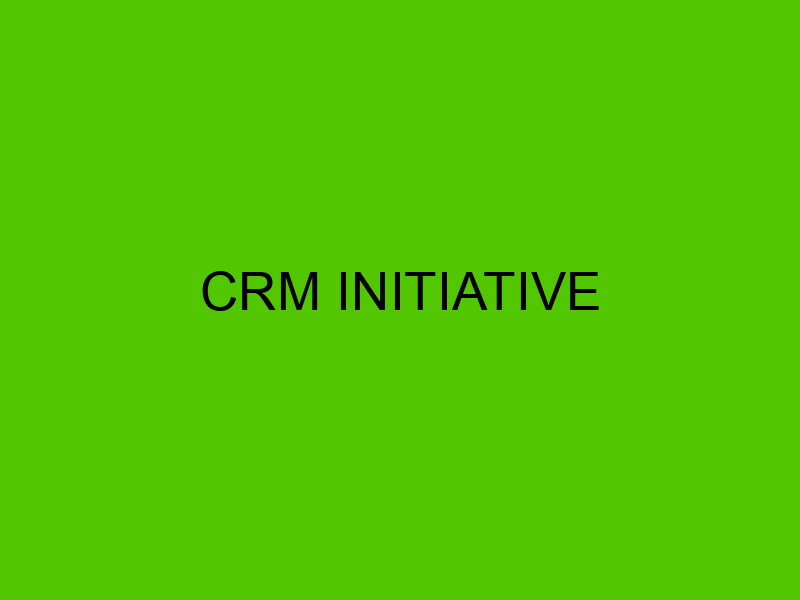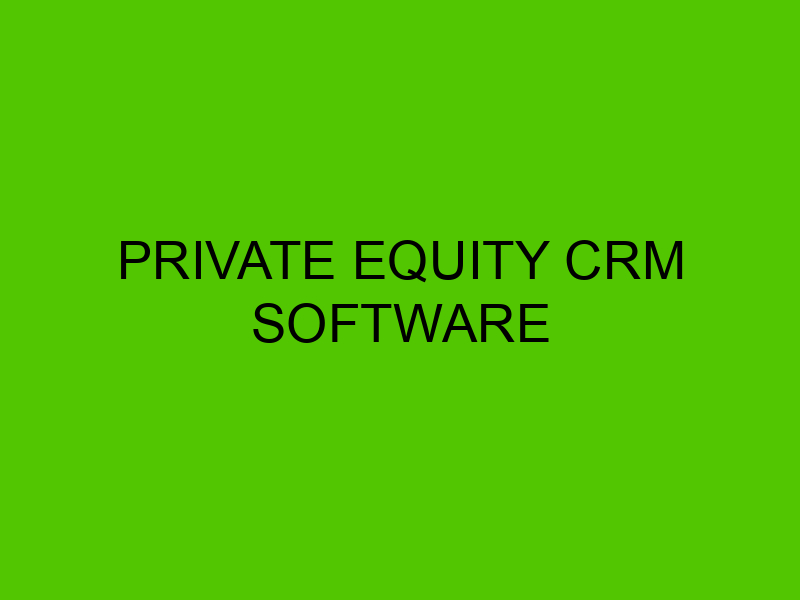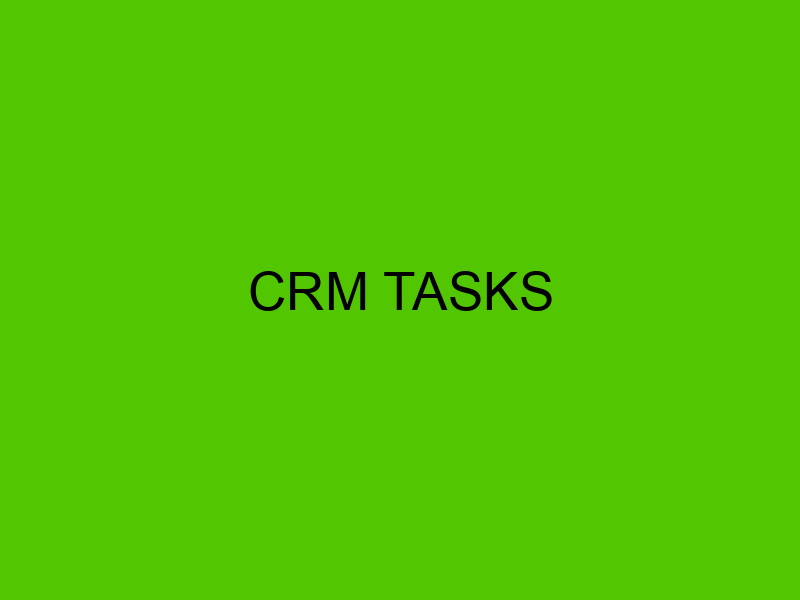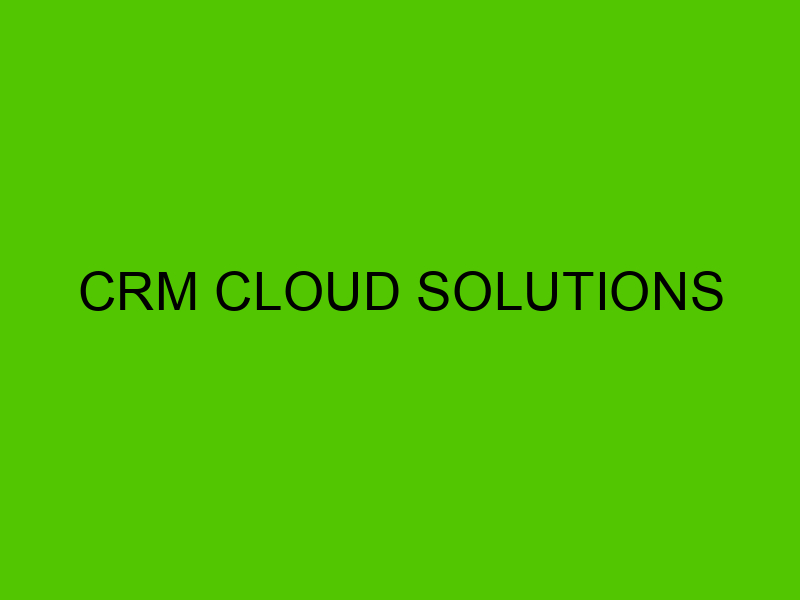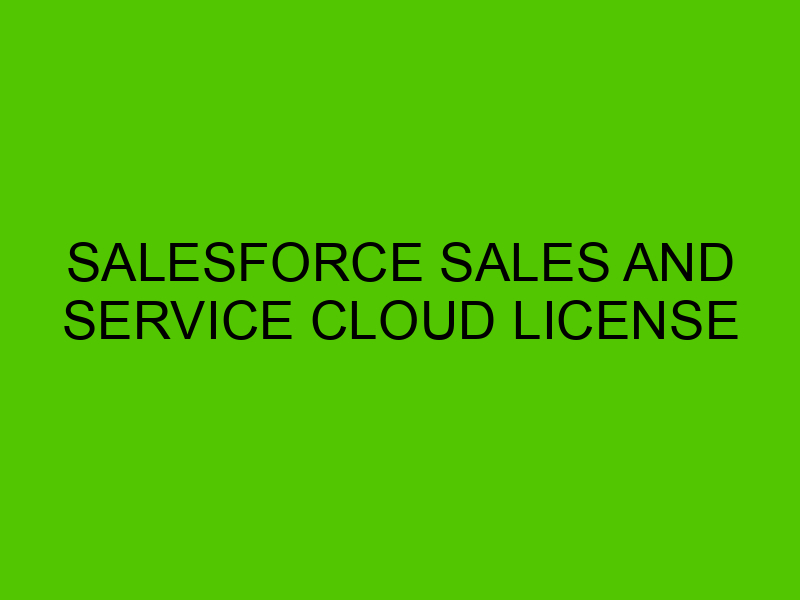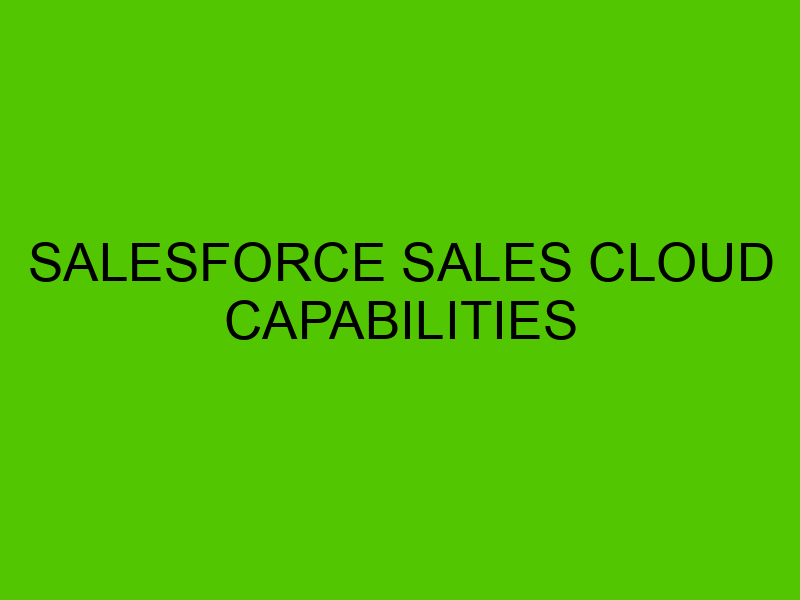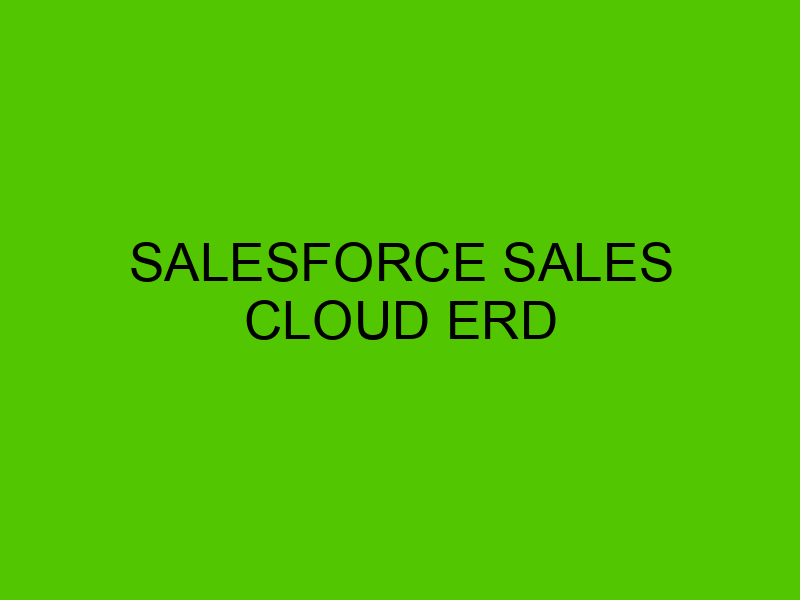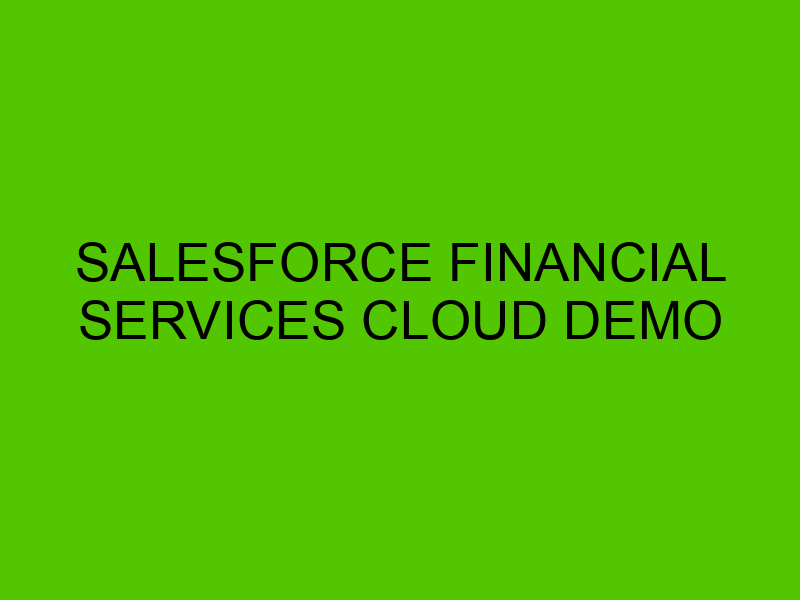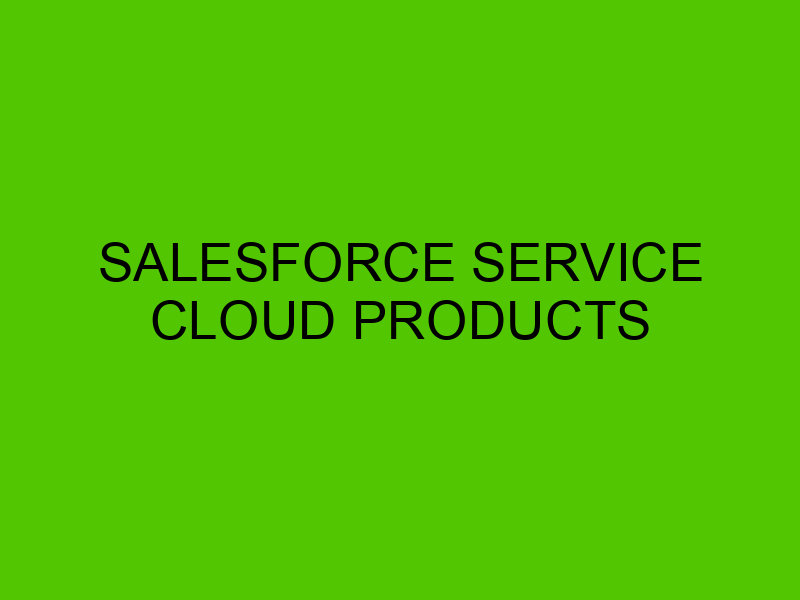Salesforce Marketing Cloud Integration with Sales Cloud
Maximizing Your Sales Potential with Salesforce Marketing Cloud Integration with Sales Cloud
Introduction: Salesforce Marketing Cloud Integration with Sales Cloud
Salesforce Marketing Cloud and Sales Cloud offer a powerful way of managing customer interactions by integrating the two cloud services. This integration allows businesses to leverage customer data obtained from the Sales Cloud to create effective marketing campaigns using Salesforce Marketing Cloud. The integration enables both services to work in synergy, which translates to better customer experiences, increased revenue, and optimized business processes.
While Sales Cloud is responsible for managing the sales pipeline, customer data, and the related tasks, Salesforce Marketing Cloud is designed to automate marketing processes, including email marketing, social media campaigns, mobile messaging, and customer journey tracking. By integrating these two cloud platforms, businesses have a complete view of the customer data, which they can use to create better-targeted marketing campaigns, personalized customer experiences, and seamless communication across channels.
The Benefits of Salesforce Marketing Cloud Integration with Sales Cloud
Businesses that integrate Salesforce Marketing Cloud with Sales Cloud can enjoy a plethora of benefits, making it a wise investment. Below are some of the major advantages:
Seamless Data Synchronization
One of the most significant benefits of integrating Salesforce Marketing Cloud with Sales Cloud is the seamless synchronization of data between the two systems. When customer data is entered into the Sales Cloud, it automatically gets updated in Salesforce Marketing Cloud, allowing for a complete view of the customer. This holistic view of the customer data can be utilized to create targeted marketing campaigns, which ultimately translates to better conversion rates and higher revenue. The integration also eliminates the need for manual data entry, thereby saving valuable employee time.
Better Customer Engagement
By leveraging the combined capabilities of Salesforce Marketing Cloud and Sales Cloud, businesses can create consistent and personalized customer experiences. The integration enables businesses to use customer data from Sales Cloud to create precisely targeted marketing campaigns, delivering the right message to the right people at the right time. This approach boosts customer engagement, improves brand loyalty, and increases customer retention rates.
Improved Sales Productivity
With the Salesforce Marketing Cloud and Sales Cloud integration, businesses can optimize the sales process, ultimately improving sales productivity. The two platforms leverage data to help identify key accounts, prospects, and leads, which can then be prioritized for targeted marketing efforts. Sales reps can focus on high-value prospects and use the customer data provided by the integration to create personalized sales pitches and offers.
Centralized Customer Data
By integrating Salesforce Marketing Cloud with Sales Cloud, businesses can create a centralized database of customer data, enabling employees to access it from one place. This centralization eliminates the need for employees to jump between different systems to access customer information. Additionally, with real-time data synchronization, the data is always up-to-date and accurate, ensuring employees have the latest information at their fingertips.
Improved Reporting and Analytics
The integration between Salesforce Marketing Cloud and Sales Cloud allows for better reporting and analytics. Businesses can create custom reports, monitor marketing campaigns, and track sales activities, all from within one system. This capability enables businesses to make data-driven decisions that improve their marketing and sales efforts, ultimately resulting in better revenue.
Conclusion
Salesforce Marketing Cloud Integration with Sales Cloud offers a host of benefits, including seamless data synchronization, better customer engagement, improved sales productivity, centralized customer data, and improved reporting and analytics. This integration unlocks the full potential of customer data, allowing businesses to create targeted marketing campaigns and personalized customer experiences that boost revenue and brand loyalty.
For businesses looking to streamline their sales and marketing efforts, the Salesforce Marketing Cloud Integration with Sales Cloud is a wise investment that delivers real results.
What is Salesforce Marketing Cloud?
Salesforce Marketing Cloud is a cloud-based software solution that allows businesses to deliver personalized and engaging marketing messages to their customers. It’s one of the most comprehensive marketing platforms available today, providing a wide range of features such as email marketing, mobile marketing, social media marketing, web personalization, and more for managing marketing campaigns. The platform integrates with Sales Cloud, which is Salesforce’s customer relationship management (CRM) solution. This integration enables marketers to have complete visibility into customer data, allowing them to gain insights into customer behavior, preferences, and interests.
Salesforce Marketing Cloud provides a range of tools that allow businesses to build brand loyalty, engage their customers, and gain new ones. With the help of this platform, businesses can create and launch campaigns across multiple channels, including email, mobile, social media, and web. The platform’s email marketing feature allows businesses to send tailored messages to customers based on their preferences and behaviors. Mobile marketing allows businesses to send text messages with promotions, alerts, and other personalized information to customers on their mobile devices. Social media marketing enables businesses to create social media campaigns and engage with customers on different social media platforms like Facebook, Twitter, and LinkedIn.
The platform’s web personalization feature allows businesses to create personalized web experiences for their customers, based on their past behavior and preferences. Businesses can also integrate their customer data from Sales Cloud with Salesforce Marketing Cloud, which gives marketers a complete view of their customers. This integration allows businesses to create more personalized and targeted marketing campaigns that resonate with customers, resulting in higher conversion rates and increased revenue.
Salesforce Marketing Cloud also provides analytic tools that allow businesses to measure the effectiveness of their marketing campaigns. The platform’s reporting and analytics features give businesses insights into customer behavior, campaign performance, and other key metrics. This data can be used to modify and optimize future campaigns, resulting in better ROI and improved customer satisfaction.
The integration between Salesforce Marketing Cloud and Sales Cloud allows businesses to provide a seamless customer experience across different channels. When a customer interacts with the brand through email or social media, their data is automatically synced with Sales Cloud, allowing the sales and marketing team to provide a better customer experience. This integration allows businesses to identify and nurture leads from marketing to sales, resulting in higher lead conversion rates and increased revenue.
In conclusion, Salesforce Marketing Cloud is a powerful marketing platform that provides businesses with a range of features to create and launch effective marketing campaigns. The integration between Salesforce Marketing Cloud and Sales Cloud enables businesses to have complete visibility into customer data, resulting in more personalized and targeted marketing campaigns. With its range of features, analytics tools, and integration capabilities, Salesforce Marketing Cloud is an essential tool for businesses looking to provide a seamless customer experience across different channels.
What is Salesforce Sales Cloud?
Salesforce Sales Cloud is the leading customer relationship management (CRM) platform that businesses use to streamline their sales processes, monitor customer interactions, and forecast revenue. With Sales Cloud, organizations can easily manage their sales pipeline, sales leads and opportunities, marketing activities, and customer data, allowing them to maximize their sales performance and achieve their business goals.
What are the key features of Salesforce Sales Cloud?
One of the key features of Salesforce Sales Cloud is the ability to manage and track sales leads and opportunities from initial contact to close. This is done through customizable sales processes and pipelines, so businesses can create workflows that match their unique selling processes. Sales Cloud also provides robust reporting and analytics tools that enable sales managers to track performance, forecast revenue, and identify trends.
Salesforce Sales Cloud also integrates with a range of other Salesforce products and third-party apps, including marketing automation solutions like Salesforce Marketing Cloud. With Marketing Cloud and Sales Cloud integration, businesses can connect their sales and marketing data, streamline lead generation and qualification, and personalize customer interactions across channels.
Another key feature of Sales Cloud is the ability to manage customer data and interactions throughout the customer lifecycle. This includes features like contact management, lead scoring, customer segmentation, and customer service case management. With Sales Cloud, businesses can improve customer retention and satisfaction by providing a more personalized and efficient customer experience.
How does Salesforce Sales Cloud integrate with Salesforce Marketing Cloud?
Salesforce Marketing Cloud and Sales Cloud integration allows businesses to connect their marketing and sales data, enabling them to create more targeted and personalized campaigns and boost overall sales performance. Here are some of the key ways in which these two Salesforce products can be integrated:
Lead Capture and Qualification
With integration between Salesforce Marketing Cloud and Sales Cloud, businesses can capture leads and automatically send them to Sales Cloud for qualification. This can be done through custom web forms, landing pages, and targeted email campaigns. Once the leads are captured, they are automatically assigned to the appropriate sales representatives based on predefined rules and criteria.
Nurture and Follow-up Campaigns
Marketing and sales teams can work together to design nurture campaigns that move leads further down the sales funnel. These campaigns can be designed and executed in Marketing Cloud and then automatically synced with Sales Cloud. Sales reps receive notifications when a lead engages with the content in the nurture campaign, allowing them to follow up with targeted, personalized messaging.
Sales and Marketing Alignment
Integrating Salesforce Marketing Cloud and Sales Cloud helps to break down the traditional silos between sales and marketing teams. With shared data and insights, both teams can work together more effectively to achieve common goals. Sales reps can see which marketing campaigns a lead has engaged with, allowing them to tailor their conversations and increase the chances of closing a deal.
Personalized Customer Interactions
Marketing Cloud and Sales Cloud integration allows businesses to create a unified view of each customer, including their preferences, behavior, and buying history. This data can be used to create more personalized and engaging customer interactions across channels, ultimately increasing customer satisfaction and loyalty.
Why is the integration important?
With the integration of Salesforce Marketing Cloud and Sales Cloud, you can unify your marketing and sales efforts and achieve a more streamlined and effective customer lifecycle management. Here are some reasons why this integration is crucial for your business:
1. Generate better leads with targeted marketing campaigns
By combining the Marketing Cloud’s comprehensive marketing automation capabilities with the Sales Cloud’s lead management features, you can create and execute targeted marketing campaigns that generate better leads. For example, you can use Marketing Cloud’s segmentation tools to identify and target highly qualified leads and then use Sales Cloud’s lead scoring and ranking to prioritize and assign them to your sales team for follow-up.
This way, your sales team can focus on the leads that are likely to convert while benefiting from the insights and data collected by the Marketing Cloud to tailor their messaging and pitch. Ultimately, this can lead to higher conversion rates, faster sales cycles, and better results.
2. Personalize customer engagement across channels
With the Salesforce Marketing Cloud Integration with Sales Cloud, you can create a unified customer profile by synchronizing customer data between the two platforms. This enables you to personalize your customer engagement across channels and touchpoints based on their characteristics, preferences, and behaviors, which can significantly improve customer satisfaction and loyalty.
For example, you can use the Marketing Cloud to create and send personalized emails, social media posts, and push notifications to customers based on their past purchases, browsing history, interests, and preferences. Then, you can sync this data with Sales Cloud to provide your sales team with a complete view of the customer’s journey, including their interactions and engagements with your brand. This can help your sales team to deliver more relevant and personalized sales pitches, increase customer engagement, and improve cross-sell and upsell opportunities.
3. Improve sales and marketing alignment and collaboration
The integration of Marketing Cloud and Sales Cloud also promotes better collaboration and alignment between sales and marketing teams. By breaking down the silos and sharing data and insights, these teams can work together towards common goals and KPIs, such as lead generation, conversion rates, and revenue growth.
For example, Marketing Cloud’s analytics and reporting features can provide Sales Cloud with insights into the performance of different marketing campaigns and channels, such as email open and click-through rates, website traffic, and campaign ROI. This data can help sales teams to prioritize leads based on their engagement and likelihood to convert and adjust their approach accordingly.
In addition, Sales Cloud’s activity tracking and lead management features can enable Marketing Cloud to create more tailored and responsive marketing campaigns based on the stage and status of each lead and their interactions with the sales team. This way, marketing and sales efforts become more aligned and coordinated, resulting in better customer experiences and more revenue opportunities.
4. Simplify data management and reduce errors
Finally, the integration between Marketing Cloud and Sales Cloud simplifies data management and reduces errors by eliminating the need for manual data entry and synchronization. With a unified view of customer and prospect data, both sales and marketing teams can spend more time analyzing and acting on insights rather than reconciling data and fixing data entry errors.
The integration also ensures data consistency and accuracy by automatically updating and syncing data between the two platforms in real-time. This means that everyone has access to the same up-to-date information, which minimizes the risk of miscommunication, duplication, and errors.
In conclusion, the integration between Salesforce Marketing Cloud and Sales Cloud is a critical success factor for companies that want to achieve a more efficient, effective, and customer-centric approach to sales and marketing. By streamlining workflows, improving collaboration, and providing a 360-degree view of customers, this integration can help you generate better leads, personalize customer engagement, improve sales and marketing alignment, and simplify data management while reducing errors.
How does the integration work?
The integration between Salesforce Marketing Cloud and Sales Cloud works smoothly through an Application Programming Interface (API). The API integration enables the two platforms to communicate and share data in real-time. Salesforce Marketing Cloud is a popular cloud-based platform that offers various marketing automation tools. It primarily focuses on email marketing, social media marketing, mobile marketing, advertising, and customer journey management. On the other hand, Sales Cloud is another Salesforce platform designed for sales teams to manage their entire sales process through one unified platform.
The integration of Salesforce Marketing Cloud with Sales Cloud allows businesses to get a 360-degree view of their customers by consolidating valuable customer data across both platforms. This allows sales and marketing teams to work collaboratively and optimize their performance, improve customer experiences and drive more revenue for the business.
When Marketing Cloud and Sales Cloud are integrated, the data captured in Marketing Cloud can be viewed in Sales Cloud accounts. It allows Sales Cloud users to view their customers’ email and campaign activities in real-time, so they can focus their engagement and communication efforts on what’s relevant to their customers. In contrast, Marketing Cloud can also access Sales Cloud data, like customer information, lead generation data, and opportunity data. This leads to more effective campaigns, better targeting of leads, and making informed decisions about the audience based on comprehensive data, which ultimately drives higher ROI.
The integration of Salesforce Marketing Cloud with Sales Cloud enhances business customer relationship management by providing a consolidated view of customer information to the entire organization. With the integration, you can easily access a range of data related to your customers like purchase history, customer support tickets, marketing campaigns, and social media interactions. The platform ensures that your business never misses out on conversions by providing complete customer information. Representatives and sales representatives can respond to customer problems more effectively.
The integration lets Marketing Cloud users leverage Sales Cloud to update or create custom objects, add or remove subscribers from campaigns and mailing lists, update marketing statuses on leads and contacts, sync the opt-out statuses of email preference centers to Sales Cloud, and more. This process ensures consistency and accuracy of data and helps save time on manual tasks.
Additionally, with the Marketing Cloud and Sales Cloud integration, marketers can build audience lists from Sales Cloud data and create precision marketing campaigns. This tactic ensures that marketing campaigns are relevant and personalized to a specific audience group. The collaboration between the two Salesforce platforms leads to an efficient sales process and better outcomes in terms of revenue, efficiency, and customer satisfaction.
In conclusion, the integration between Salesforce Marketing Cloud and Sales Cloud offers numerous benefits for businesses looking to gain a 360-degree view of their customers. This integration enables businesses to synchronize customer data across both platforms, leading to an accurate and comprehensive customer profile. It enables sales and marketing teams to optimize their engagement strategies, improves customer experiences, and drives higher revenue. Your business can leverage this integration to boost its sales process, improve audience targeting, personalize marketing campaigns to distinct customer segments, and incrementally improve customer satisfaction.
Overview
Salesforce, a company offering customer relationship management solutions, provides two primary cloud-based systems that complement each other: Sales Cloud and Marketing Cloud. While they may seem distinct, integrating these two platforms can have a significant impact on customer engagement and overall business success.
Benefits of Integration
Integrating Salesforce Marketing Cloud with Sales Cloud has numerous benefits, including:
- Improved Lead Management: When leads are generated through Marketing Cloud campaigns, they can be automatically transferred into Sales Cloud for follow-up. This streamlines the process and ensures that no leads are lost or overlooked.
- Increased Personalization: By integrating the two clouds, data from Sales Cloud can be used to personalize Marketing Cloud campaigns. This results in higher engagement rates as customers see relevant content based on their interactions with the business.
- Better Collaboration: When the two clouds are integrated, sales reps have access to the same real-time data that marketing teams do, which allows for better collaboration and quicker decision-making.
- Improved Reporting: By connecting Marketing Cloud and Sales Cloud, businesses can track the entire customer journey—from initial contact through to closed-won deals. This enables better reporting and analysis, which can inform future marketing and sales efforts.
- Enhanced Marketing Automation: Sales Cloud can trigger Marketing Cloud campaigns based on specific actions within the platform, such as when a deal moves to a new stage or when a lead fills out a form. This automation streamlines the process and ensures that customers receive the right messaging at the right time.
- Better Lead Scoring: By integrating Marketing Cloud and Sales Cloud, lead scoring can be improved as sales reps have direct access to a lead’s full interaction history with the business. This makes it easier to prioritize leads and focus efforts on the most valuable prospects.
- Improved Customer Experience: By integrating Marketing Cloud and Sales Cloud, businesses can create a seamless customer experience. Customers receive relevant messages throughout their journey, and sales reps have the data they need to provide personalized support.
How to Integrate Salesforce Marketing Cloud with Sales Cloud
Integrating Salesforce Marketing Cloud with Sales Cloud is a process that requires careful planning and execution. To integrate the two systems, follow these steps:
- Ensure that both Marketing Cloud and Sales Cloud are properly set up and configured. This includes creating custom fields, building out lead capture forms, and setting up campaigns.
- Determine what data should be included in the integration. This could include things like lead capture data, email engagement metrics, and more.
- Decide on the integration method. Salesforce provides several options for integrating the two systems, including using a connector, using an integration platform, or building a custom integration.
- Set up the integration. This will vary depending on the integration method chosen, but will generally involve connecting the two systems and configuring the data flow.
- Test the integration to ensure that data is flowing correctly between the two systems.
- Train staff on the new processes and workflows resulting from the integration.
- Maintain the integration to ensure that data continues to flow correctly and that the integration remains up-to-date with changes to either system.
Conclusion
Integrating Salesforce Marketing Cloud with Sales Cloud has numerous benefits for businesses, including improved lead management, increased personalization, better collaboration, and enhanced marketing automation. By following the steps outlined above, businesses can successfully integrate these two powerful platforms and gain a competitive edge in the market.


